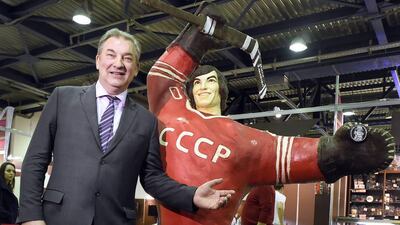Former Soviet Union ice hockey star Vladislav Tretiak came face-to-face with a life-size chocolate doppelganger created to mark the opening of a confectionery fair in Moscow.
At two metres tall with an arm raised as if in victory, the cocoa-based statue shows triple Olympic champion Tretiak in the red uniform of CSKA Moscow, where he played as goalkeeper.
“This gives me a great deal of pleasure, especially since this year we’re celebrating the 70th anniversary of ice hockey in Russia,” said the 63-year-old, who is currently president of the national ice hockey federation.
Created by chocolatier Mila Zakatova, the sweet sculpture weighs around 100 kilograms.
“I love those medieval stories about strong, brave Russian knights. Today, it’s sportsmen like Tretiak who are those knights for me,” Zakatova said.
After the close of Moscow’s fifth Salon du Chocolat, the effigy will be transferred to the capital’s chocolate museum, she said.
Follow us on Twitter @NatSportUAE
Like us on Facebook at facebook.com/TheNationalSport

